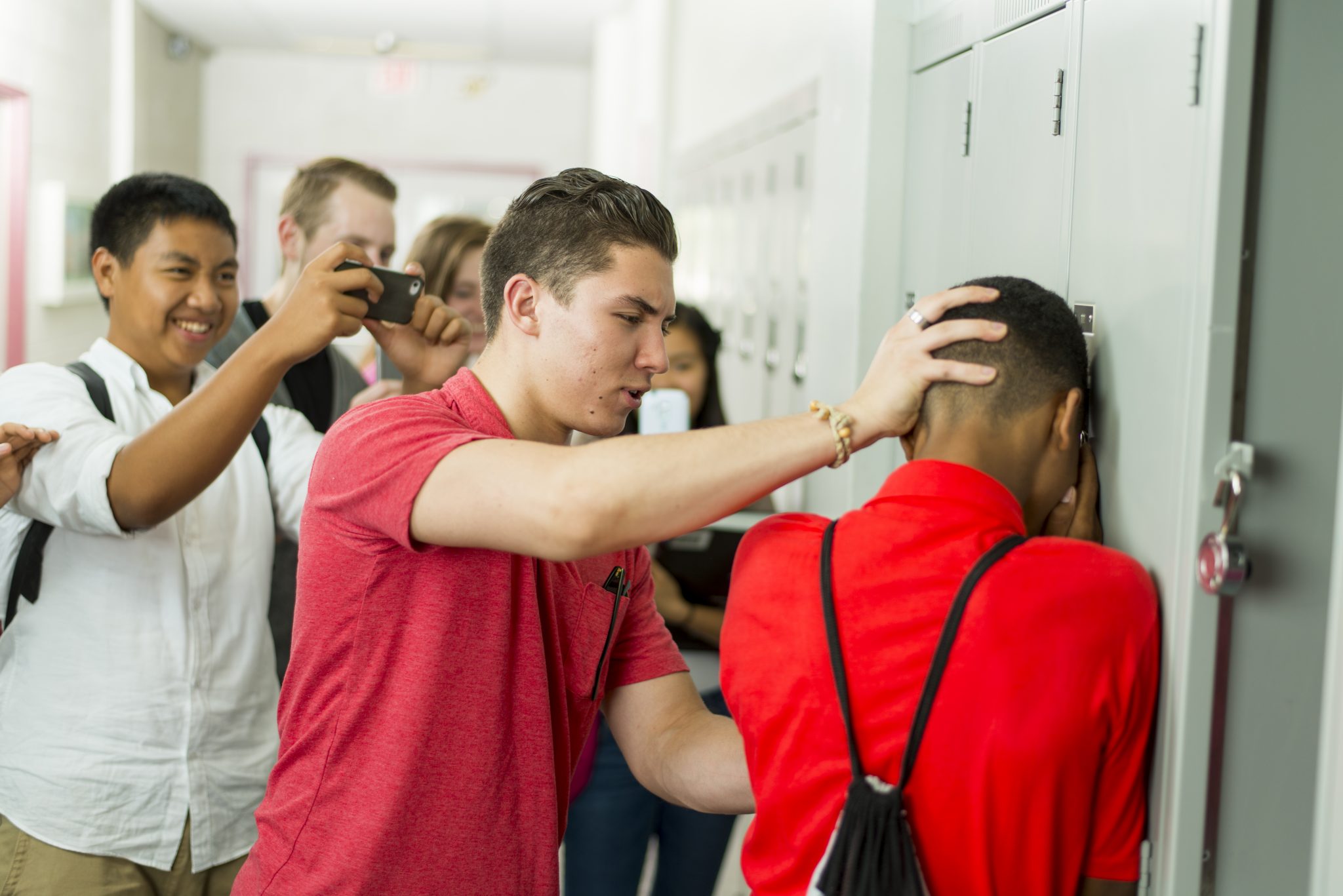Home & Family

In this first of a five-part series, you will learn parenting strategies to help youth ages 12 to 17 navigate bullying situations.
Bullying is a concern for many parents/guardians, schools, and community members. Bullying by definition is aggressive and repetitive behavior that involves an imbalance of social power or physical strength. Most adults think bullying does not affect their family if their child is not labeled a bully or a victim. Studies have found, however, that all youth who are present when bullying behaviors take place contribute to these negative behaviors, whether they intend to or not.
This article will help parents/guardians to understand bystander roles in bullying situations, and learn ways to encourage their teens to defend others.
The Role of Peers
Studies have found that bystanders are present in 80 percent of bullying incidents. Bystanders therefore play an important role in encouraging or discouraging bullying. Researchers have identified four bystander roles that youth play in bullying situations:
Assistants join in the bullying by helping to attack the victim. This group often gets in trouble when bullying is reported, because they were directly involved.
Reinforcers encourage the bullying by laughing, cheering, or recording the incident.
Outsiders see bullying happening but keep to themselves. Although outsiders are not active participants in bullying situations, they allow the bullying to continue, because they do not help or report.
Defenders provide comfort and support to the victims. These individuals act in ways that help to stop the bully from continuing hurtful behaviors.
It is not uncommon for youth to ignore victims of bullying and appear more like the bullies in order to fit in with the larger peer group. Some youth might try to fit in on purpose, while others might just get too anxious to react.
While it may be challenging for youth to feel willing and able to defend those being bullied, there are two qualities that can increase the likelihood that they will help: empathy and confidence they can succeed. Some youth already have the empathy and confidence required, but others need assistance to get there. Adults can help youth to develop these skills.
The ability to relate to another person’s feelings and emotions (empathy) is important to develop in those who are assistants and reinforcers. Youth who are outsiders might need to develop confidence and skills to believe they have the ability and courage to stand up for a victim.
Building Empathy in Assistants and Reinforcers
Empathy is an important characteristic to develop in all youth—especially assistants and reinforcers, because these groups play a powerful role in encouraging or discouraging bullying behaviors. Qualities of empathy include sharing feelings of distress as a result of seeing others suffering; the motivation to care for individuals who are bullied; and the ability to put oneself in the mind of another individual and imagine what that person is thinking or feeling.
When adults help youth to empathize with the victim, it influences how youth act when bullying situations occur. Adults can encourage empathy in the following ways:
- Model empathy. If you observe someone in distress (in real life, on TV, or in a book), talk with your teen about how that person must feel. Even a very brief conversation might have an effect.
- Help youth to discover what they have in common with other people. Individuals tend to feel greater empathy for someone else when they think that the individual is like them in some way. Help youth to see those similarities, even across differences.
- Teach youth that being kind is who they are at the core. The practice of telling youth that the reason they are kind, helpful, and care about others is because it is their nature to do so is a powerful way to increase empathy in assistants and reinforcers. The assumption is that youth who are encouraged to see themselves as responsible people who care about others will learn to behave that way.
Building Defender Behavior in Outsiders
 In bullying situations, outsiders do not defend or react. They often feel bad about the bullying they see but do not feel confident in their ability to help. Raising their confidence could help them transition from outsiders to defenders.
In bullying situations, outsiders do not defend or react. They often feel bad about the bullying they see but do not feel confident in their ability to help. Raising their confidence could help them transition from outsiders to defenders.
Parents/guardians can inspire children to become defenders by helping them to believe in the importance of trying to help when they see someone in need. This guidance can help youth step out of their comfort zone and increase the likelihood that they will report or defend others in a bullying situation. Encouragement is only the first step; however, parents/guardians need to help youth create a plan. Start with a plan that does not involve direct conflict. Here is an example of an action plan to help your teen defend others:
- Talk to victims after they have been bullied and make sure they are OK.
- Tell victims that you do not agree with what happened to them and that it is wrong.
- Go with victims to tell an adult what has happened.
Creating a plan of action can help youth to feel like they are doing something to help others. These small steps can eventually empower them to say Stop! when they see a bullying situation occurring.
When youth defend someone who is being bullied, it is important to reward this behavior regardless of how big or small the action. When youth feel rewarded because they have defended others, they are more motivated to do it again. Using these tips can help to increase the likelihood that youth, who would have otherwise just stood by and watched, become defenders.
Conclusion
Although most youth are against bullying, they tend to act in ways that encourage bullying behavior. Raising awareness of the roles that youth might play during bullying situations can help to encourage them to act in ways that show they are against bullying. It is important to help youth remember that bystanders who speak up can be successful in helping the victim.
Parents/guardians must also support their teens when they support someone else. Studies have shown that youth who believe that their parents/guardians expect them to defend someone being bullied are more willing to help stop the bullying. This support is key to reducing bullying and creating a safer school environment for all.
Adrienne M. Duke, Extension Specialist, Assistant Professor; Dee Dee Secrest, former Undergraduate Research Assistant; and Jessica Norton, Graduate Research Assistant, all in Human Development and Family Studies, Auburn University
Reviewed November 2021, Advancing Bullying Awareness: Strategies for Increasing Defending Behaviors in Youth, FCS-2265

